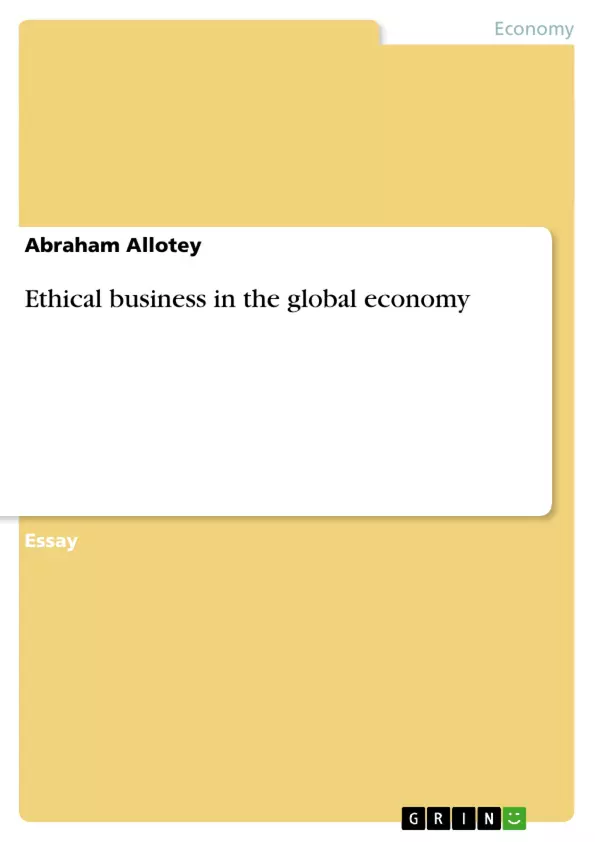There is so much talk about ethical versus unthical business practices in business environments in recent years than it has always been before the year 2002. A few of the reasons for these emphasis are: Globalization, fair-play and security.
Ethics is not always defined the same in all cultures. For instance, a business practice that can easily be refered to and accepted as unthical in one particular culture, would not necessarily be accepted as unethical in another culture.
Therefore, at what point in time can we collectively agree, that a particular business practice is unethical, and would it be possible to deploy uniformed (same) tools to combat unethical business practices accross cultures?
This report discusses some implications and bottlenecks of ethical practices and concludes with some practical recommendations.
Inhaltsverzeichnis (Table of Contents)
- Introduction
- Definitions of Ethics and Business Ethics
- Social Responsibility of Business
- Responsibilities of Business - Archie Carroll's Model
- The Shortcomings of Ethical Decision Making in Global Business
- Rules of The Game
- Conclusions
- Recommendations
- Literature, References, BBC World TV Interview
Zielsetzung und Themenschwerpunkte (Objectives and Key Themes)
This report explores the complexities of ethical business practices within the global economy, examining the pressures and challenges that arise from globalization, economic integration, and global sourcing. It delves into the definitions of ethics and business ethics, the social responsibilities of businesses, and the shortcomings of ethical decision-making in a global context.
- Defining ethics and business ethics in the global context
- Examining the social responsibilities of businesses in the global economy
- Analyzing the shortcomings of ethical decision-making in global business
- Exploring the role of corporations in shaping ethical standards
- Developing recommendations for ethical business practices in a globalized world
Zusammenfassung der Kapitel (Chapter Summaries)
- Introduction: This chapter introduces the topic of ethics in the global economy, highlighting the increasing attention it receives due to globalization and the pursuit of competitive advantage. It examines the role of profit in business success and discusses the common perception of “business ethics” as an oxymoron.
- Definitions of Ethics and Business Ethics: This chapter delves into the concept of ethics and its philosophical study of human conduct and its governing rules. It presents various definitions of ethics, including the consensus-based standards of behavior for specific professions and the examination of moral conflicts in business practices. The chapter also explores the holistic view of business ethics, encompassing a wide range of criteria like fair competition, advertising aesthetics, and social responsibilities.
- Social Responsibility of Business: This chapter examines the social responsibilities of businesses, focusing on Archie Carroll's model. This model suggests that corporations must first fulfill their economic and legal responsibilities before considering social responsibilities. It highlights the importance of ethical behavior and philanthropic contributions as discretionary responsibilities.
Schlüsselwörter (Keywords)
The key terms and focus topics of this work include: business ethics, globalization, global sourcing, economic integration, social responsibility, ethical decision-making, corporate responsibility, stakeholder engagement, compliance, self-regulation, and ethical frameworks.
Frequently Asked Questions
Why has business ethics become more prominent in recent years?
Factors such as globalization, the need for fair play, and increased security concerns since 2002 have made ethical practices a central topic in business environments.
Is business ethics defined the same way across all cultures?
No, ethics can vary significantly between cultures. A practice accepted in one culture might be considered unethical in another, posing challenges for global business.
What is Archie Carroll's model of social responsibility?
It is a model suggesting that corporations have a hierarchy of responsibilities: first economic and legal, followed by ethical and philanthropic (discretionary) duties.
What are the main challenges of ethical decision-making globally?
Challenges include differing "rules of the game" in various countries, the pressure for profit, and the complexity of global sourcing and economic integration.
What are the recommendations for ethical global business?
The report suggests deploying uniform frameworks, stakeholder engagement, and self-regulation to combat unethical practices across different cultural contexts.
- Quote paper
- Abraham Allotey (Author), 2002, Ethical business in the global economy, Munich, GRIN Verlag, https://www.grin.com/document/93145



